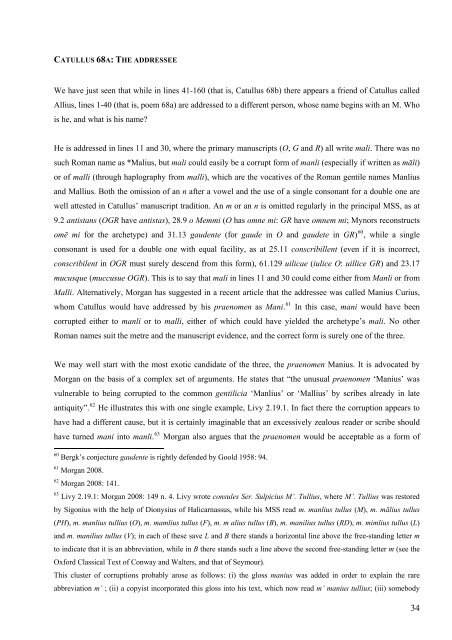CATULLUS 68 - Scuola Normale Superiore
CATULLUS 68 - Scuola Normale Superiore
CATULLUS 68 - Scuola Normale Superiore
You also want an ePaper? Increase the reach of your titles
YUMPU automatically turns print PDFs into web optimized ePapers that Google loves.
<strong>CATULLUS</strong> <strong>68</strong>A: THE ADDRESSEE<br />
We have just seen that while in lines 41-160 (that is, Catullus <strong>68</strong>b) there appears a friend of Catullus called<br />
Allius, lines 1-40 (that is, poem <strong>68</strong>a) are addressed to a different person, whose name begins with an M. Who<br />
is he, and what is his name?<br />
He is addressed in lines 11 and 30, where the primary manuscripts (O, G and R) all write mali. There was no<br />
such Roman name as *Malius, but mali could easily be a corrupt form of manli (especially if written as māli)<br />
or of malli (through haplography from malli), which are the vocatives of the Roman gentile names Manlius<br />
and Mallius. Both the omission of an n after a vowel and the use of a single consonant for a double one are<br />
well attested in Catullus’ manuscript tradition. An m or an n is omitted regularly in the principal MSS, as at<br />
9.2 antistans (OGR have antistas), 28.9 o Memmi (O has omne mi: GR have omnem mi; Mynors reconstructs<br />
omē mi for the archetype) and 31.13 gaudente (for gaude in O and gaudete in GR) 60 , while a single<br />
consonant is used for a double one with equal facility, as at 25.11 conscribillent (even if it is incorrect,<br />
conscribilent in OGR must surely descend from this form), 61.129 uilicae (iulice O: uillice GR) and 23.17<br />
mucusque (muccusue OGR). This is to say that mali in lines 11 and 30 could come either from Manli or from<br />
Malli. Alternatively, Morgan has suggested in a recent article that the addressee was called Manius Curius,<br />
whom Catullus would have addressed by his praenomen as Mani. 61 In this case, mani would have been<br />
corrupted either to manli or to malli, either of which could have yielded the archetype’s mali. No other<br />
Roman names suit the metre and the manuscript evidence, and the correct form is surely one of the three.<br />
We may well start with the most exotic candidate of the three, the praenomen Manius. It is advocated by<br />
Morgan on the basis of a complex set of arguments. He states that “the unusual praenomen ‘Manius’ was<br />
vulnerable to being corrupted to the common gentilicia ‘Manlius’ or ‘Mallius’ by scribes already in late<br />
antiquity”. 62 He illustrates this with one single example, Livy 2.19.1. In fact there the corruption appears to<br />
have had a different cause, but it is certainly imaginable that an excessively zealous reader or scribe should<br />
have turned mani into manli. 63 Morgan also argues that the praenomen would be acceptable as a form of<br />
60<br />
Bergk’s conjecture gaudente is rightly defended by Goold 1958: 94.<br />
61<br />
Morgan 2008.<br />
62<br />
Morgan 2008: 141.<br />
63<br />
Livy 2.19.1: Morgan 2008: 149 n. 4. Livy wrote consules Ser. Sulpicius M’. Tullius, where M’. Tullius was restored<br />
by Sigonius with the help of Dionysius of Halicarnassus, while his MSS read m. manlius tullus (M), m. mālius tullus<br />
(PH), m. manlius tullius (O), m. mamlius tullus (F), m. m alius tullus (B), m. manilius tullus (RD), m. mimlius tullus (L)<br />
and m. manilius tullus (V); in each of these save L and B there stands a horizontal line above the free-standing letter m<br />
to indicate that it is an abbreviation, while in B there stands such a line above the second free-standing letter m (see the<br />
Oxford Classical Text of Conway and Walters, and that of Seymour).<br />
This cluster of corruptions probably arose as follows: (i) the gloss manius was added in order to explain the rare<br />
abbreviation m’ ; (ii) a copyist incorporated this gloss into his text, which now read m’ manius tullius; (iii) somebody<br />
34






